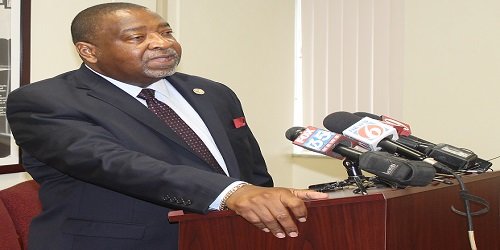 Daytona Beach, FL
Daytona Beach, FL - Is Bethune-Cookman University on the verge of extinction?
That depends on who you ask.
In announcing a press conference today (October 16th) with interim President
Hubert Grimes, the group hired by the university to handle its public relations informed the media the day prior that Grimes would talk about the various financial and legal issues placing the school on the "verge of extinction".
But when it came time to talk to reporters inside the school's on-campus library, the former long-time Volusia County Judge took exception to those specific words, saying it didn't come from him and that he had "faith" that the school would emerge from its current issues.
"Our problems reflect the culmination of years of inadequate accountability, suspect governance, and, quite frankly, inexcusable management decisions," Grimes added. "In the last five years, we've experienced an existential threat to our legacy and our existence."
Grimes did admit during the press conference that the school could be in danger of closing its doors for good should it not resolve its issues, especially the over $100 million in debt, which stems in large part from the legal mess surrounding the over $300 million Moorehead dorm project and other issues which eventually led to former BCU President Edison O. Jackson's departure.
"Undoubtedly, the dorm transaction looms as our major financial hurdle," Grimes added. "But other governance and financial issues have festered and further exacerbated the crisis."
Among those other issues is the school's current probationary status as an accredited member of the Southern Association of Colleges and Schools Commission on Colleges (SACSCOC). That probation came down last June, giving BCU up to two years to get its situation resolved or face the removal of that accreditation. Should that happen, it would seriously threaten the school's ability to get federal monies and its students' chances of getting grant money for their studies.
That "crisis" spilled out in a public way on Monday when
hundreds of BCU students held a rally at the steps of White Hall in support of Grimes, fearing that he could be fired by the school's Board of Trustees during its meeting later this week and eventually leave them with worthless degrees, especially if SACSCOC pulls its accreditation.
Grimes told the press that SACSCOC accreditation likely wouldn't be affected whether he stays or goes, but he did admit that his departure at such a critical point might be seen as a sign of instability by SACSCOC officials, even though the school is currently in the process of hiring Jackson's permanent replacement.
He also acknowledged that there was tension between members of the BOT and himself over the best way to move forward, at one point pausing to think when a reporter asked him if he felt there were any BOT members left who did not have the school's best interests in their hearts.
"We do have issues that we gotta deal with," Grimes added. "And, if there are people in this community that want to help us, it's time for them to step forward. The criticism time is behind us."
His plan for fixing those issues includes a potential refinancing of the Moorehead project, urging alumni to help the school find "Wall Street experts" to do that.
Responding to a reporter's question about a lawsuit which claims he has a conflict of interest in the Moorehead deal, Grimes called it a "bunch of lies", saying that he was hired as university counsel seven months after the Moorehead project deal was approved by the BOT in April 2015.
Grimes also pledged more transparency into the school's financial issues, telling the media he plans to share the details of a forensic audit focusing on Jackson's actions should the BOT give its approval to do so.
BCU's BOT plans to hold two days' worth of meetings on Thursday. Those meetings are not open to the public.
 Daytona Beach, FL - Is Bethune-Cookman University on the verge of extinction?
That depends on who you ask.
In announcing a press conference today (October 16th) with interim President Hubert Grimes, the group hired by the university to handle its public relations informed the media the day prior that Grimes would talk about the various financial and legal issues placing the school on the "verge of extinction".
But when it came time to talk to reporters inside the school's on-campus library, the former long-time Volusia County Judge took exception to those specific words, saying it didn't come from him and that he had "faith" that the school would emerge from its current issues.
"Our problems reflect the culmination of years of inadequate accountability, suspect governance, and, quite frankly, inexcusable management decisions," Grimes added. "In the last five years, we've experienced an existential threat to our legacy and our existence."
Daytona Beach, FL - Is Bethune-Cookman University on the verge of extinction?
That depends on who you ask.
In announcing a press conference today (October 16th) with interim President Hubert Grimes, the group hired by the university to handle its public relations informed the media the day prior that Grimes would talk about the various financial and legal issues placing the school on the "verge of extinction".
But when it came time to talk to reporters inside the school's on-campus library, the former long-time Volusia County Judge took exception to those specific words, saying it didn't come from him and that he had "faith" that the school would emerge from its current issues.
"Our problems reflect the culmination of years of inadequate accountability, suspect governance, and, quite frankly, inexcusable management decisions," Grimes added. "In the last five years, we've experienced an existential threat to our legacy and our existence."